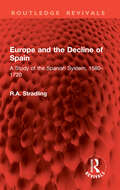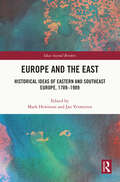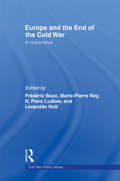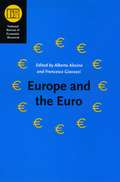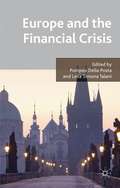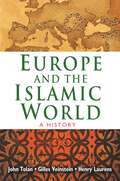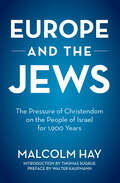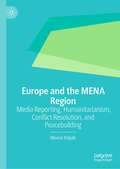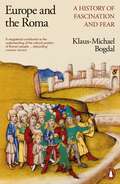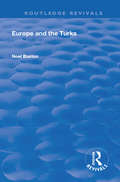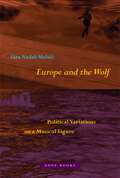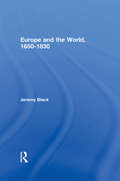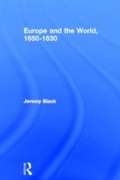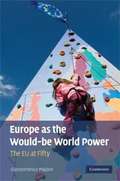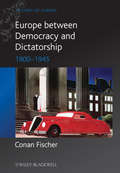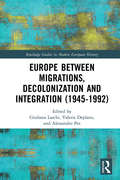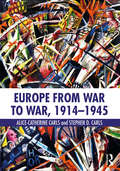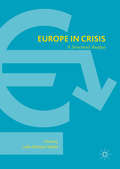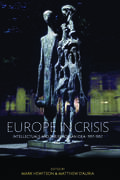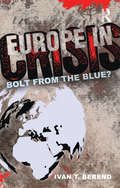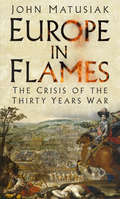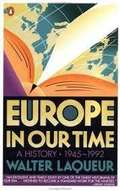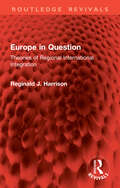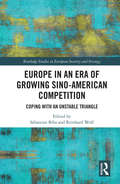- Table View
- List View
Europe and the Decline of Spain: A Study of the Spanish System, 1580–1720 (Routledge Revivals)
by R.A. StradlingFirst published in 1981, Europe and the Decline of Spain deals with the slow ebbing of Spanish power, its ‘melancholy, long, withdrawing roar’ during the ‘long seventeenth century’ of pre-industrial Europe. The author looks at the fortunes of Spanish European hegemony from its apogee late in the reign of Philip II to its ultimate failure and dissolution about a century later.The author examines the dynamic spiritual and material resources of Spain as a politico-military system of continental dominance and control. He places the system in a context of continuous general European war, and structures and events in Spain and its provinces are set in this context.A feature of the book is the description of changing approaches to the Spanish system by its major adversaries. This, along with a fresh look at the events themselves, has conditioned a reinterpretation of Spain’s ‘political’ decline which stresses its centrality to an overview of the whole period.
Europe and the East: Historical Ideas of Eastern and Southeast Europe, 1789-1989 (Ideas beyond Borders)
by Mark Hewitson Jan VermeirenThis volume investigates competing ideas, images, and stereotypes of a European ‘East’, exploring its role in defining European and national conceptions of self and other since the eighteenth century. Through a set of original case studies, this collection explores the intersection between discourses about a more distant, exotic, or colonial ‘Orient’ with a more immediate ‘East’. The book considers this shifting, imaginary border from different points of view and demonstrates that the location, definition, and character of the ‘East’, often associated with socio-economic backwardness and other unfavourable attributes, depended on historical circumstances, political preferences, cultural assumptions, and geography. Spanning two centuries, this study analyses the ways that changing ideals and persistent clichéd attitudes have shaped the conversation about and interpretations of Eastern Europe. Europe and the East will be essential reading for anyone interested in images and ideas of Europe, European identity, and conceptions of the ‘East’ in intellectual and cultural history.
Europe and the End of the Cold War: A Reappraisal (Cold War History)
by N. Piers Ludlow Marie-Pierre Rey Frédéric Bozo Leopoldo NutiThis book seeks to reassess the role of Europe in the end of the Cold War and the process of German unification. Much of the existing literature on the end of the Cold War has focused primarily on the role of the superpowers and on that of the US in particular. This edited volume seeks to re-direct the focus towards the role of European actors and the importance of European processes, most notably that of integration. Written by leading experts in the field, and making use of newly available source material, the book explores "Europe" in all its various dimensions, bringing to the forefront of historical research previously neglected actors and processes. These include key European nations, endemic evolutions in the Soviet Union and Eastern Europe, European integration, and the pan-European process. The volume serves therefore to rediscover the transformation of 1989-90 as a European event, deeply influenced by European actors, and of great significance for the subsequent evolution of the continent.
Europe and the Euro
by Alberto Alesina Francesco GiavazziIt is rare for countries to give up their currencies and thus their ability to influence such critical aspects of their economies as interest and exchange rates. Yet ten years ago a number of European countries did exactly that when they adopted the euro. Despite some dissent, there were a number of arguments in favor of this policy change: it would facilitate exchange of goods, money, and people by decreasing costs; it would increase trade; and it would enhance efficiency and competitiveness at the international level. A decade is an ideal time frame over which to evaluate the success of the euro and whether it has lived up to expectations. To that aim, Europe and the Euro looks at a number of important issues, including the effects of the euro on reform of goods and labor markets; its influence on business cycles and trade among members; and whether the single currency has induced convergence or divergence in the economic performance of member countries. While adoption of the euro may not have met the expectations of its most optimistic proponents, the benefits have been many, and there is reason to believe that the euro is robust enough to survive recent economic shocks. This volume is an essential reference on the first ten years of the euro and the workings of a monetary union.
Europe and the Financial Crisis
by Leila Simona Talani Pompeo Della PostaThe global financial and economic crisis has brought about many effects that are still difficult to interpret univocally. This book studies the consequences of the crisis on Europe by examining the effects on the European institutional setup, governance and architecture and by studying in detail the different member countries.
Europe and the Islamic World: A History
by John Tolan Gilles Veinstein Henry LaurensA sweeping history of Islam and the West from the seventh century to todayEurope and the Islamic World sheds much-needed light on the shared roots of Islamic and Western cultures and on the richness of their inextricably intertwined histories, refuting once and for all the misguided notion of a "clash of civilizations" between the Muslim world and Europe. In this landmark book, three eminent historians bring to life the complex and tumultuous relations between Genoans and Tunisians, Alexandrians and the people of Constantinople, Catalans and Maghrebis—the myriad groups and individuals whose stories reflect the common cultural, intellectual, and religious heritage of Europe and Islam.Since the seventh century, when the armies of Constantinople and Medina fought for control of Syria and Palestine, there has been ongoing contact between the Muslim world and the West. This sweeping history vividly recounts the wars and the crusades, the alliances and diplomacy, commerce and the slave trade, technology transfers, and the intellectual and artistic exchanges. Here readers are given an unparalleled introduction to key periods and events, including the Muslim conquests, the collapse of the Byzantine Empire, the commercial revolution of the medieval Mediterranean, the intellectual and cultural achievements of Muslim Spain, the crusades and Spanish reconquest, the rise of the Ottomans and their conquest of a third of Europe, European colonization and decolonization, and the challenges and promise of this entwined legacy today.As provocative as it is groundbreaking, this book describes this shared history in all its richness and diversity, revealing how ongoing encounters between Europe and Islam have profoundly shaped both.
Europe and the Jews: The Pressure of Christendom on the People of Israel for 1,900 Years
by Malcolm HayA detailed and moving account of the indignities and cruelties Jews have undergone at the hands of Christians and others in the West, from St John Chrysostom in the 4th century to Hitler in the 20th. Using Hitler's concentration camps as a point of departure, Hay leads us on a tour of the devilish scenes and spectacles which have been produced by Christian hatred of Jews for some 1900 years.
Europe and the MENA Region: Media Reporting, Humanitarianism, Conflict Resolution, and Peacebuilding
by Moosa ElayahThis book provides an overview of the National Dialogue design process in fragile settings at the national, regional, and international levels in the MENA region. It provides a comparative analysis at the international level by examining the Yemeni NDC 2013 with those of Afghanistan and Ethiopia, and at the regional level, focusing on Iraq and Tunisia. It also goes beyond the traditional exploration of political and social conflicts by adding a rich theoretical layer of analysis of Humanitarian Aid and its contribution to war economies in the Arab region. Finally, it examines the news frames used in the coverage of the conflicts in the Middle East and North Africa and takes one step further to integrate a media lens by analysing the extent of the media coverage devoted to the Yemeni and Syrian wars by four prestigious European online news platforms. This incisive book presents a radical contrast between the on-ground reality of the conflicts in the region, distinguished by various social, political, economic, geographic, and humanitarian challenges, and its discordant abstract portrayal in European online media.
Europe and the Roma: A History of Fascination and Fear
by Klaus-Michael Bogdal‘A magisterial contribution to the understanding of the cultural position of Romani people in Europe. … nothing short of astounding’ Literary ReviewThis remarkable book describes a dark side of European history: the rejection of the Roma from their initial arrival in the late Middle Ages to the present day. To Europeans, the Roma appeared to be in complete contradiction with their own culture, because of their mysterious origins, unknown language and way of life. As representatives of an oral culture, for centuries the Roma have left virtually no written records of their own. Their history has been conveyed to us almost exclusively through the distorted images that European cultures project.Persecuted and shunned, the Roma nonetheless spread out across the continent and became an important, indeed indispensable element in the European imagination. It is impossible to conceive of the culture of Spain, southern France and much of Central Europe without this pervasive Romani influence.Europe and the Roma brilliantly describes the 'fascination and fear' which have marked Europeans' response to the Romani presence. Countless composers, artists and writers have responded to Romani culture and to fantasies thereof. Their projections onto a group whose illiteracy and marginalization gave it so little direct voice of its own have always been a very uneasy mixture of the inspired, the patronizing and the frighteningly ignorant. The book also shows the link between cultural violence, social discrimination and racist policies that paved the way for the genocide of the Roma.
Europe and the Turks (Routledge Revivals)
by Noel BuxtonPublished in 1912: It was long foretold by all who knew the Balkans at first hand. Three solutions alone could have averted it: reform from within, reform by suasion, and reform by coercion. This volume depicts the futilities of the first.
Europe and the Wolf: Political Variations on a Musical Figure
by Sara Nadal-MelsióHow the work of several contemporary artists illuminates and challenges the policing of European borders and identityIn this stunningly original book, Sara Nadal-Melsió explores how the work of several contemporary artists illuminates the current crisis of European universalist values amid the brutal realities of exclusion and policing of borders. The &“wolf&” is the name Baroque musicians gave to the dissonant sound produced in any attempt to temper and harmonize an instrument. Europe and the Wolf brings this musical figure to bear on contemporary aesthetic practices that respond to Europe&’s ongoing social and political contradictions. Throughout, Nadal-Melsió understands Europe as a conceptual problem that often relies on harmonization as an organizing category. The &“wolf&” as an emblem of disharmony, incarnated in the stranger, the immigrant, or the refugee, originates in the Latin proverb &“man is a wolf to man.&” This longstanding phrase evokes the pervasive fear, and even hatred, of what is foreign, unknown, or beyond the borders of a community. The book follows the &“wolf&” in a series of relays between the musical, the visual, and the political, and through innovative readings of artworks—by, among others, Carles Santos, Pere Portabella, Allora&Calzadilla, and Anri Sala. Traversed by the musical, these artworks, as well as Nadal-Melsió&’s writing, present unstable symbolic and material ensembles in an array of variations of political possibilities and impossibilities that evade institutions intolerant of uncertainty and wary of diversity.
Europe and the World, 1650-1830
by Jeremy Black Professor Jeremy BlackEurope and the World, 1650-1830 is an important thematic study of the first age of globalisation. It surveys the interaction of Europe, Europe's growing colonies and other major global powers, such as the Ottoman Empire, China, India and Japan. Focusing on Europe's impact on the world, Jeremy Black analyses European attitudes, exploration, trade and acquisition of knowledge.
Europe and the World: 1650-1830
by Jeremy BlackConcise summary of the international history of the period.
Europe as the Would-be World Power: The EU at Fifty
by Giandomenico MajoneFor fifty years European integration has been pursued according to an operational code based on rules which have never been publicly discussed. This book demonstrates the far-reaching consequences of the prioritisation of integration over competing values, fait accompli and other implicit rules of action. The willingness to sacrifice democracy on the altar of integration is demonstrated by the monopoly of legislative initiative granted to the non-elected Commission. Monetary union preceding, rather than following, political integration is a striking example of fait accompli, and the reason behind many holes in the EU system of economic governance. Until now, academics have avoided radical criticism; Giandomenico Majone argues that only an open acknowledgement of the obsolescence of the traditional methods can stem the rising tide of Euro-scepticism.
Europe between Democracy and Dictatorship: 1900 - 1945 (Blackwell History of Europe #8)
by Conan FischerFischer offers a captivating analysis of Europe’s turbulent history during the first half of the twentieth century, from the optimism at the turn of the century to the successive waves of destruction of the First and Second World Wars. Written by a leading authority in this field, the book draws upon his areas of expertise Reflects the most recent scholarship in this period of history While laying stress on Europe's major powers and the seminal events of the earlier twentieth century, Fischer pays due attention to the smaller European countries from the Atlantic to the Black Sea and the Baltic to the Mediterranean Extends beyond the political, sociological, and economic paradigms to include extensive references to the European cultural scene Organized both as a broad chronology and thematically, in order to allow for historical insights and entry into the key debates and literature
Europe between Migrations, Decolonization and Integration (Routledge Studies in Modern European History)
by Giuliana Laschi Valeria Deplano Alessandro PesThis monograph addresses mobility and migrations as contributing phenomena in shaping contemporary Europe after 1945, in connection with decolonisation and the creation of the European Community. The disappearing of the colonial empires caused a large movement of people (former colonizers as well as formerly colonized people) from the extra-European countries to the "Old continent"; while the European integration project encouraged the movement of the citizens within the Community. The book retraces how, in both cases, migrations and mobility impacted the way national communities, as well as the European one, have been defining themselves and their real and imaginary boundaries.
Europe from War to War, 1914–1945
by Alice-Catherine Carls Stephen D. CarlsEurope from War to War, 1914–1945 explores this age of metamorphosis within European history, an age that played a crucial role in shaping the Europe of today. Covering a wide range of topics such as religion, arts and literature, humanitarian relief during the wars, transnational feminism, and efforts to create a unified Europe, it examines the social and cultural history of this period as well as political, economic, military, and diplomatic perspectives. Thematically organized within a chronological framework, this book takes a fully comparative approach to the era, allowing the reader to follow the evolution of key trends and ideas across these 30 turbulent years. Each period is analyzed from both an international and a domestic perspective, expanding the traditional narrative to include the role and impact of European colonies around the world while retaining a close focus on national affairs, everyday existence within Europe itself and the impact of the wars on people’s lives. Chapters include discussion of regions such as Scandinavia, the Balkans, and Iberia that are less frequently covered, emphasizing the network of connections between events and places across the continent. Global in scope, accessibly written and illustrated throughout with photographs and maps, this is the perfect introductory textbook for all students of early twentieth-century European history.
Europe in Crisis
by Leila Simona TalaniWith contributions from a range of expert scholars in European economics, politics and social policy, this edited collection analyses the crisis in Europe by exploring the structural asymmetries of the Economic and Monetary Union (EMU) and European monetary integration. Structured in two parts, the chapters in this book discuss the impact of the global financial crisis on the Euro area; the failed implementation of the Lisbon Strategy; wage imbalances in the European labour market; the development of EU financial regulation; the Greek debt crisis; and the relationship between Italy and the EMU. The conclusion to the book puts forward a potential way out of the European crisis and argues that the correct measures, thus far, have not been taken to bolster financial stability. In Europe in Crisis, Talani and her contributors aim to identify the impact of the crisis on the future of the EMU and the EU project as a whole.
Europe in Crisis
by Mark Hewitson Matthew D'AuriaThe period between 1917 and 1957, starting with the birth of the USSR and the American intervention in the First World War and ending with the Treaty of Rome, is of the utmost importance for contextualizing and understanding the intellectual origins of the European Community. During this time of 'crisis,' many contemporaries, especially intellectuals, felt they faced a momentous decision which could bring about a radically different future. The understanding of what Europe was and what it should be was questioned in a profound way, forcing Europeans to react. The idea of a specifically European unity finally became, at least for some, a feasible project, not only to avoid another war but to avoid the destruction of the idea of European unity. This volume reassesses the relationship between ideas of Europe and the European project and reconsiders the impact of long and short-term political transformations on assumptions about the continent's scope, nature, role and significance.
Europe in Crisis: Bolt from the Blue? (Variorum Collected Studies #739)
by Ivan BerendThis book analyzes the European Great Recession of 2008-12, its economic and social causes, its historical roots, and the policies adopted by the European Union to find a way out of it. It contains explicit debates with several economists and analysts on some of the most controversial questions about the causes of the crisis and the policies applied by the European Union. It presents the cases of Iceland, Greece and Ireland, the countries that first declined into crisis in Europe, each of them in a different way. Iceland is a case study for reckless banking practices, Greece of reckless public spending, and Ireland of reckless household indebtedness. At least seven other countries, mostly from the peripheries of Europe, had similarly reckless banking and spending practices. In the center of the book are the economic and social causes of the crisis. Contemporary advanced capitalism became financialized, de-industrialized and globalized and got rid of the "straitjacket" of regulations. Solid banking was replaced by high-risk, "casino-type" activity. The European common currency also had a structural problem — monetary unification without a federal state and fiscal unification. The other side of the same coin is European hyper-consumerism. A new lifestyle emerged during two super-prosperous periods in the 1950s to 1960s, and during the 1990s to 2006. Trying to find an exit policy, the European Union turned to strict austerity measures to curb the budget deficit and indebtedness. This book critically analyzes the debate around austerity policy. The creation of important supra-national institutions, and of a financial supervisory authority and stability mechanisms, strengthens integration. The correction of the euro’s structural mistake by creating a quasi-fiscal unification is even more important. The introduction of mandatory fiscal rules and their supervision promises a long-term solution for a well-functioning common currency. These measures, meanwhile, create a two-tier European Union with a fast-track core. This book suggests that the European Union will emerge stronger from the crisis. This book will be of particular interest to students and researchers of economics, history, political science and international finance, but will also prove profitable reading for practitioners and the interested public.
Europe in Flames: The Crisis of the Thirty Years War
by John MatusiakThe Thirty Years War claimed more lives proportionately than either the First or Second World Wars – not only from battle and the endemic violence of marauding armies, but also from famine and plague. The bitter struggle encompassed the entire political and religious future of Europe and involved all the major players of the Continent. As the turmoil unfolded, vast mercenary armies exacted an incalculable toll upon helpless civilian populations, while their commanders and the men who equipped them frequently grew rich on the profits, leaving rulers perched on the brink of catastrophe. When peace came in 1648, the underlying tensions were far from wholly resolved. In Europe in Flames John Matusiak provides a compelling account of this most tumultuous time, exploring the causes, course and outcomes of a conflict that not only produced one of the greatest manmade calamities of its kind, but changed the direction of European history forever.
Europe in Our Time: A History, 1945-1992
by Walter Laqueur"An encyclopedic amount of information is analyzed with considerable wisdom and a felicitous style."--Simon Serfaty, Johns Hopkins Univ. Laqueur presents a fascinating overview of post-war Europe, providing detailed analyses that cover every major political development, economic and social trends, and cultural movements since 1945. "An excellent work destined to become a standard text for the 90s."--Library Journal.
Europe in Question: Theories of Regional International Integration (Routledge Revivals)
by Reginald J. HarrisonThis book was originally published in 1974 when there were many theories attempting to explain the problems of international political integration. This book provides a critical analysis of the theories, relating them to relevant hypotheses in politics, economic and sociology. It treats separately functionalism, federalism and contemporary neo-functionalism. The author offers a number of hypotheses which place more stress on the conflicts inherent in late 20th Century international politics and in the domestic politics of Western European societies. Written for postgraduate and undergraduate alike, any terminology is carefully explained or used in a self-explanatory context
Europe in an Era of Growing Sino-American Competition: Coping with an Unstable Triangle (Routledge Studies in European Security and Strategy)
by Sebastian Biba Reinhard WolfThis book investigates how Europe should position itself in an era of growing Chinese-American rivalry. The volume explores the contemporary relationship and ongoing dynamics between three of the most powerful players in today’s international relations - the USA, China and Europe. It claims that the intensifying antagonism between Washington and Beijing requires a paradigm shift in European strategic thinking, and takes a trilateral perspective in analysing key issue areas, such as trade, technology, investment, climate change, the BRI, sub-national contacts, maritime security and nuclear non-proliferation. Using this analysis, the work seeks to offer original policy recommendations that respond to a number of dilemmas Europe can no longer avoid, including the trade-off between European interests and values in a harsher global environment, the question of whether Europe should align with one of the two superpowers, Europe’s military dependence on a US pivoting to the Asia-Pacific, and possible trade-offs between global and regional governance efforts. The key finding is that Europe must follow a much more pragmatic and independent approach to its foreign and security affairs. This book will be of much interest to students of EU policy, foreign policy, Chinese politics, US politics and IR in general.
